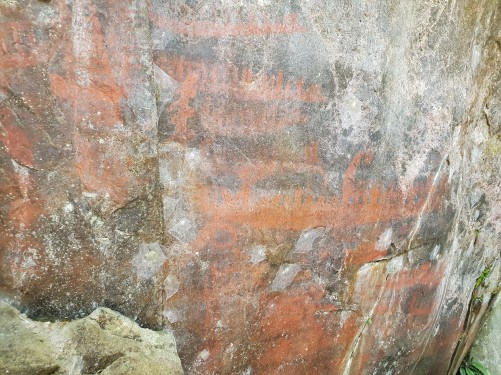Rotorua is a tale of two cities: while tourism, business, forestry and farming flourish, the rest of the population are denied access to the benefits of economic growth and the spread of poverty is accelerating.
The smell of sulphur pervades the air. No wonder fire and brimstone (the Biblical version of sulphur) is the style of preaching favoured by the Destiny Church, founded here. We are in Rotorua to do some touristy things, mainly involving some cautious explorations of geothermal activities directly linked to the hellish interior of the planet.
I am also looking forward to seeing progress in New Zealand’s first official bilingual city, announced in 2017. The signs coming in to town are promising, with English on the left and Maori on the right:

So, on to the sulphuric hot spots. Our first visit is the Waiotapu Thermal Park.

The sign is in Maori, but I cannot see any explanation of its meaning “sacred waters”. Although most Kiwis could work that out, I translate for our overseas visitor.

The sites in Waiotapu are also labelled in Māori, although without the explanations which could add to the experience. Roto Kārikitea has interesting scientific information, but not that its name means the “light green lake”:

At nearby Lake Tarawera there is a faded bilingual explanation beside some rock paintings. We can just make out its description of the 1886 volcanic eruption which caused the lake to rise and flood the caves with their depictions of canoes, which luckily became visible again when the water receded in the early 20th century:

Back in town I do not see much evidence of the bilingual “reo rua” policy, but have since read that the focus of the Council’s partner Te Tatau o Te Arawa is on developing “te reo Māori zones” such as children’s playgrounds, which incorporate stories and history. And the Maori children quoted in the 2018 Council update are keen to get on with it:
I want people to speak (entirely) in Māori. I want my parents to speak Māori to me.
(Samantha, aged 10)
Leaving town we drive pass a steaming fence, where not long ago boiling mud bubbled up in someone’s back garden. In Rotorua fire and brimstone is just below the surface, but these children know what they want for the future of their city.

Interesting! Didn’t know it was the first official bilingual city. Wonder how many others there are?
Sent from my iPhone
LikeLike
Not sure about others, but I do know that Wellington has an official plan to become a bilingual capital: https://www.stuff.co.nz/dominion-post/news/wellington/104689962/te-tauihu-policy-first-step-towards-wellington-becoming-te-reo-mori-capital
LikeLike